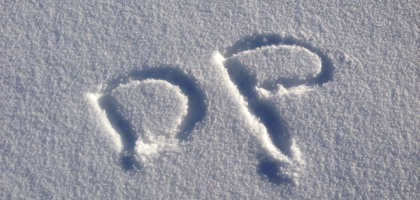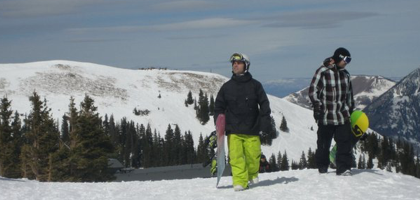
The smell of the four-stroke emissions hung in the crisp, cold air. The inside of my hands were warm from the heated grips of the Arctic Cat snowmobile. I walked down a well-used boot track through the trees beyond the couples and the tourists and their foot prints across a frozen lake. As I gazed out, a perfect blanket of untouched snow filled my peripheral. In my view, there was not a part of the landscape that was touched by the hand of man. Perfect as it was intended to be, in the way that nature just does.
I reached down, and before I knew what I was doing, I had traced David’s initials into the snow. It was an involuntary thing—it just happened. I looked down, and there were his initials where he would have been standing next to me, looking out across the same peaceful and majestic scene.
What did it take to create the view I was gazing across? Millions of years… who was I in respect to this view? Merely a blink of the eye in time. But that whole day, there was this ingestion of some of nature’s wonder, and internally, I was once again grieving for the loss of my brother. I ran through potential dialogues we might have had. I would be watching his face as he looked at something through a different lens. I could hear his voice in my head, and in this place, there was a different David speaking to me. It was a voice that may have possibly understood. It takes patience for all of this. The beauty doesn’t happen over night—it is the culmination of years of peace and rapid violence, scarring and rebuilding as the order of things reassembles itself into a new view even more beautiful than before as a result of its scars.
Patience, I thought to myself… probably the one trait I can honestly say my brother had very little of. The patience to allow time to work its magic and to heal and transform. I found myself thinking of him with every view from the thermals to a random bald eagle soaring above. The more mature voice of David in my head is actually understanding and respecting the massiveness of the surrounding,s and I imagined his sorrow for what he had done, having barred himself from the opportunity to see what my eyes were now digesting.
I walked away from that lake his initials left in the snow. How many other people would see it that day? How long would it take for a breeze to wash away the wound I had caused in the snow, like the winter tide taking back the sandcastle I had made?
The rides in between stops allowed me the time to zen out, the sound of the snowmobile piercing the warmth of my helmet all along. I was able to allow my eyes to just focus on the snowmobile tracks ahead. My hands are adjusting the bars as the sled found its way through the snow. My appendages are reacting to my surroundings, but my mind was purely focused on his face, his voice. I had the conversations that anybody who has lost somebody this close has in their minds with the person, trying to make sense of the senseless.
Why hadn’t we taught him patience?
Why, as his guardian and older brother, was I not able to demonstrate that trying to force the hand of things we cannot change would merely frustrate, and that had he focused his efforts on the things, he could—would—provide the solace he was seeking?
He was with me the whole day, as he always is. But during those twelve hours, I was able to wrap myself in the blanket of the majestic and have this conversation that I resolved to share with those left behind. Patience. Breathe, and take your time—you will likely be surprised at the results.


